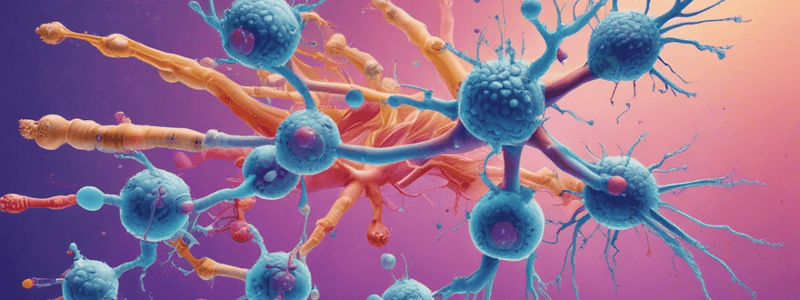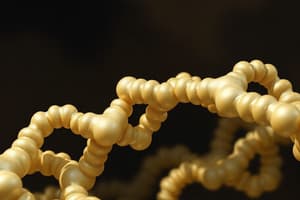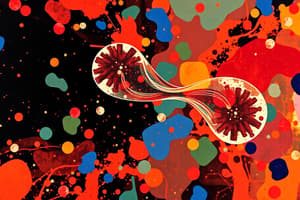Podcast
Questions and Answers
What is the primary function of IgG antibodies in the humoral response?
What is the primary function of IgG antibodies in the humoral response?
- Triggering antibody-mediated cytotoxicity
- Opsonization and enhancing phagocytosis (correct)
- Activating natural killer cells
- Neutralizing pathogens
In which bodily secretions is IgA predominantly found?
In which bodily secretions is IgA predominantly found?
- Blood
- Tears, saliva, breastmilk, and mucus (correct)
- Urine
- Sweat
Which of the following is NOT a function of IgG1 and IgG3 antibodies?
Which of the following is NOT a function of IgG1 and IgG3 antibodies?
- Neutralizing pathogens (correct)
- Triggering antibody-mediated cytotoxicity
- Activating complement
- Opsonization
What is the primary structure of IgA antibodies?
What is the primary structure of IgA antibodies?
Which IgG subclass is particularly effective at triggering antibody-mediated cytotoxicity by Natural Killer cells?
Which IgG subclass is particularly effective at triggering antibody-mediated cytotoxicity by Natural Killer cells?
What is the primary difference between IgA and IgG antibodies?
What is the primary difference between IgA and IgG antibodies?
Which co-receptor binds an antigen bound to the complement component C3d?
Which co-receptor binds an antigen bound to the complement component C3d?
After the antigen binds to the BCR, what happens to the antigen?
After the antigen binds to the BCR, what happens to the antigen?
What is the function of CD19?
What is the function of CD19?
What happens to the B-cell after the antigen binds to the BCR?
What happens to the B-cell after the antigen binds to the BCR?
CD80/86 binds to which protein on TH cells for T-cell activation?
CD80/86 binds to which protein on TH cells for T-cell activation?
To which type of T-helper cell does the B-cell present the antigen within germinal centers of a lymphoid follicle?
To which type of T-helper cell does the B-cell present the antigen within germinal centers of a lymphoid follicle?
What is the stage at which immunoglobulin gene recombination begins?
What is the stage at which immunoglobulin gene recombination begins?
What is the function of Ig-α in the B-cell receptor?
What is the function of Ig-α in the B-cell receptor?
What happens to a pre-B cell if its BCR is unproductive?
What happens to a pre-B cell if its BCR is unproductive?
Where do immature B cells travel to after maturation?
Where do immature B cells travel to after maturation?
What is the purpose of the second checkpoint during B-cell development?
What is the purpose of the second checkpoint during B-cell development?
What is the role of stromal cells in the bone marrow?
What is the role of stromal cells in the bone marrow?
What is the result if a pre-B cell's BCR is self-reactive at the second checkpoint?
What is the result if a pre-B cell's BCR is self-reactive at the second checkpoint?
What is the type of B cell that leaves the bone marrow?
What is the type of B cell that leaves the bone marrow?
What is the primary mechanism of neutralization by antibodies?
What is the primary mechanism of neutralization by antibodies?
What is the result of the co-stimulatory interaction between iCOSL and iCOS during B-cell activation?
What is the result of the co-stimulatory interaction between iCOSL and iCOS during B-cell activation?
Which of the following antibody functions promotes clearance of pathogens?
Which of the following antibody functions promotes clearance of pathogens?
What is the primary function of plasma cells?
What is the primary function of plasma cells?
What is the role of IgM in the primary immune response?
What is the role of IgM in the primary immune response?
During the late primary response, what process results in the production of high-affinity antibodies?
During the late primary response, what process results in the production of high-affinity antibodies?
Which of the following antibody functions involves the activation of Fc receptor on Natural killer cells?
Which of the following antibody functions involves the activation of Fc receptor on Natural killer cells?
What is the role of IL-21 in B-cell activation?
What is the role of IL-21 in B-cell activation?
What is the purpose of complement activation by antibodies?
What is the purpose of complement activation by antibodies?
What is the result of antibody class switching?
What is the result of antibody class switching?
Which of the following antibody classes is characterized by its ability to activate complement?
Which of the following antibody classes is characterized by its ability to activate complement?
What is the initial affinity of antibodies produced during the early primary response?
What is the initial affinity of antibodies produced during the early primary response?
What is the typical structure of IgM when it is secreted?
What is the typical structure of IgM when it is secreted?
Which of the following is a characteristic of IgM's antigen binding?
Which of the following is a characteristic of IgM's antigen binding?
What is the primary function of IgE antibodies?
What is the primary function of IgE antibodies?
Which type of cells do IgD antibodies primarily bind to?
Which type of cells do IgD antibodies primarily bind to?
What is the primary characteristic of IgE antibodies?
What is the primary characteristic of IgE antibodies?
Where are IgD antibodies primarily found?
Where are IgD antibodies primarily found?
What is the primary function of IgD antibodies?
What is the primary function of IgD antibodies?
What happens when IgE antibodies bind to cells with Fc receptor?
What happens when IgE antibodies bind to cells with Fc receptor?
What type of cells does IgE primarily bind to?
What type of cells does IgE primarily bind to?
What is the primary function of IgE antibodies in terms of granulocytes?
What is the primary function of IgE antibodies in terms of granulocytes?
During B-cell development, which checkpoint ensures that immature B cells that recognize self-antigens are eliminated?
During B-cell development, which checkpoint ensures that immature B cells that recognize self-antigens are eliminated?
What is the primary function of the paracortex in the lymph node?
What is the primary function of the paracortex in the lymph node?
During B-cell activation, what is the primary role of Th cells?
During B-cell activation, what is the primary role of Th cells?
What is the result of somatic hypermutation in B cells?
What is the result of somatic hypermutation in B cells?
During antibody class switching, which class of antibodies is typically produced in a secondary immune response?
During antibody class switching, which class of antibodies is typically produced in a secondary immune response?
What is the primary location where B cells undergo differentiation into plasma cells or memory cells?
What is the primary location where B cells undergo differentiation into plasma cells or memory cells?
What is the primary mechanism by which IgG antibodies facilitate phagocytosis?
What is the primary mechanism by which IgG antibodies facilitate phagocytosis?
Which of the following IgG subclasses is NOT involved in activating the complement system?
Which of the following IgG subclasses is NOT involved in activating the complement system?
What is the primary function of IgA antibodies found in blood?
What is the primary function of IgA antibodies found in blood?
What is the primary difference between IgA and IgG antibodies in terms of their structures?
What is the primary difference between IgA and IgG antibodies in terms of their structures?
Which of the following IgG subclasses is involved in triggering antibody-mediated cytotoxicity by Natural Killer cells?
Which of the following IgG subclasses is involved in triggering antibody-mediated cytotoxicity by Natural Killer cells?
Which co-receptor is expressed on the immature B cell in the spleen?
Which co-receptor is expressed on the immature B cell in the spleen?
What is the primary component of the BCR on the mature but naive B cell in the spleen?
What is the primary component of the BCR on the mature but naive B cell in the spleen?
What is the primary function of the follicular dendritic cells in the lymph node?
What is the primary function of the follicular dendritic cells in the lymph node?
What is the primary region of the lymph node where antigen presentation occurs?
What is the primary region of the lymph node where antigen presentation occurs?
Which type of cells are predominantly found in the paracortex of the lymph node?
Which type of cells are predominantly found in the paracortex of the lymph node?
What is the primary function of the medulla in the lymph node?
What is the primary function of the medulla in the lymph node?
How do antigens flow into a lymph node?
How do antigens flow into a lymph node?
What is the primary function of dendritic cells in the periphery?
What is the primary function of dendritic cells in the periphery?
What is the primary function of the BCR in the germinal center?
What is the primary function of the BCR in the germinal center?
What determines the specificity of an antibody?
What determines the specificity of an antibody?
What is the primary function of plasma cells?
What is the primary function of plasma cells?
What is the characteristic of memory B cells that distinguishes them from naive B cells?
What is the characteristic of memory B cells that distinguishes them from naive B cells?
What is the result of somatic hypermutation in the germinal center?
What is the result of somatic hypermutation in the germinal center?
What is the primary function of the variable region of the heavy chain?
What is the primary function of the variable region of the heavy chain?
What is the primary function of memory B cells?
What is the primary function of memory B cells?
What is the purpose of the germinal center in the humoral response?
What is the purpose of the germinal center in the humoral response?
Flashcards are hidden until you start studying
Study Notes
Antibody Functions
- Antibodies are good at agglutinating pathogens, immobilizing them, and allowing for phagocytosis
- Antibody classes:
- IgG: most common antibody found in serum, has various subclasses (IgG1, IgG2, IgG3, IgG4), secreted as a monomer, produced later in humoral response
- Functions: opsonization, activating complement, and triggering antibody-mediated cytotoxicity by Natural Killer cells
- IgA: predominantly found as a dimer, secreted into tears, saliva, breastmilk, and mucus, functions in neutralizing and agglutinating pathogens
- Can also be found in blood as a monomer with similar functions to IgG
B-Cell Development
- B cells develop from common lymphoid precursors into Pre-pro B cells in the bone marrow
- B cells become irreversibly committed to the B-cell lineage at the pro-B cell stage, where immunoglobulin gene recombination begins
- As B cells mature, their surface markers change, allowing for communication with stromal cells in the bone marrow
- The B-cell receptor (BCR) is a membrane-bound antibody that associates with a disulfide-linked heterodimer (Ig-α & Ig-β)
B-Cell Activation
- Antigen binds to the BCR with the help of a B-cell co-receptor (CD21) and initiates a downstream signaling cascade promoting B-cell survival and proliferation
- The antigen is presented to the B cell, which increases its expression of co-stimulatory molecules (CD80/86, iCOSL, CD40)
- The B cell presents the antigen to a T-helper cell within germinal centers of a lymphoid follicle, leading to the formation of an immunologic synapse
Antibody Production
- After interaction with a Tfh cell, some B-cells differentiate into plasma cells for antibody secretion
- Some B-cells move into germinal centers of lymphoid follicles, where they undergo antibody class switching, somatic hypermutation, and production of high-affinity antibodies
Antibody Classes and Functions
- There are 5 main classes of antibodies: IgM, IgG, IgD, IgE, and IgA
- General antibody functions include:
- Neutralization: inactivating pathogens and preventing binding to cells
- Agglutination: preventing pathogen binding to cells and promoting clearance
- Opsonization: promoting phagocytosis
- Complement activation: initiating the classical pathway and promoting phagocytosis
- Antibody-dependent cell-mediated cytotoxicity: activating Natural Killer cells and inducing apoptosis of infected cells
- Degranulation: activating Fc granulocytes and triggering degranulation
Antibody Classes
- IgG: most common antibody found in serum, secreted as a monomer, produced later in the humoral response
- Functions: opsonization, binding to Fc receptor on phagocytes to enhance phagocytosis, IgG1 and IgG3 activate complement, IgG2alpha triggers antibody-mediated cytotoxicity by Natural Killer cells
- IgA: predominantly found as a dimer, secreted into tears, saliva, breastmilk, and mucus
- Functions: neutralizing pathogens, agglutinating pathogens, inducing degranulation of granulocytes
- IgE: secreted as a monomer in small quantities, binds to cells with Fc receptor for IgE triggering degranulation of granulocytes (eosinophils, basophils, mast cells)
- IgD: secreted as a monomer in very small quantities, most prevalent in secretions of the upper respiratory tract, binds to basophils and mast cells
B-Cell Development and Activation
- B-cell development stages in bone marrow:
- Stages: pro-B, large pre-B, small pre-B, immature B, mature B
- Two checkpoints in bone marrow:
- Checkpoint 1: after pro-B stage, ensures proper rearrangement of heavy chain genes
- Checkpoint 2: after small pre-B stage, ensures proper rearrangement of light chain genes
- B-cell development after bone marrow:
- Immature B cells migrate to spleen, where they express CD21 and IgD, and are considered mature but naive
- Mature naive B cells enter general circulation, then migrate to lymph nodes
- B-cell activation:
- Naive B cells encounter antigen in lymph node through one of two ways:
- Antigen flows into lymph node through afferent lymphatics and binds to BCR
- Macrophages or dendritic cells encounter antigen in periphery and bring it to lymph node
- Antigen recognition leads to B-cell activation, which requires three signals:
- Signal 1: antigen binding to BCR
- Signal 2: co-stimulation by CD40 and CD40L
- Signal 3: cytokine stimulation by Tfh cells
- Naive B cells encounter antigen in lymph node through one of two ways:
Lymph Node Structure and Function
- Lymph nodes are bean-shape structures with three main regions:
- Cortex: contains lymphocytes, macrophages, and follicular dendritic cells, arranged into primary follicles that enlarge into secondary follicles with germinal centers after antigen exposure
- Paracortex: contains mostly T-lymphocytes and dendritic cells, which present antigens to T-helper cells
- Medulla: more sparsely populated with lymphoid-linage cells, often plasma cells actively secreting antibody molecules
B-Cell Activation and Differentiation
- B-cell activation leads to differentiation into plasma cells or memory B cells
- Plasma cells:
- No longer have BCR, secrete large numbers of antibody molecules
- Memory B cells:
- Circulate in periphery, continue to express BCR, longer-lived than naive B-cells
- Differentiation into memory B cells is unclear
Antibody Structure and Function
- Antibody structure: protein molecules with two heavy chains and two light chains
- Heavy chain: constant region (Fc) and variable region (Fab)
- Light chain: variable region and antigen-binding portion
- Antibody functions: six categories:
- Neutralizing pathogens
- Agglutinating pathogens
- Opsonization
- Complement activation
- Antibody-mediated cytotoxicity
- Inducing degranulation of granulocytes
Studying That Suits You
Use AI to generate personalized quizzes and flashcards to suit your learning preferences.




